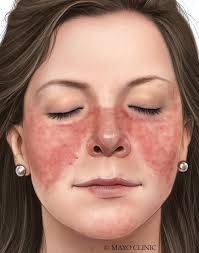Lupus
Lupus, or systemic lupus erythematosus (SLE), is a chronic autoimmune disease where the immune system attacks healthy tissues and organs. It can affect the skin, joints, kidneys, heart, lungs, brain, and blood cells.
---
Causes
The exact cause of lupus is unknown, but it involves a combination of genetic, environmental, and hormonal factors:
1. Genetics:
A family history of autoimmune diseases increases the risk.
2. Hormonal Factors:
Lupus is more common in women, suggesting a link with estrogen.
3. Environmental Triggers:
Sunlight exposure.
Certain infections (e.g., Epstein-Barr virus).
Stress or trauma.
Exposure to chemicals or toxins.
4. Medications:
Drug-induced lupus can occur with certain medications like hydralazine or procainamide, though it usually resolves once the drug is discontinued.
---
Signs and Symptoms
1. General Symptoms:
Fatigue.
Fever.
Weight loss.
2. Skin and Hair:
Butterfly-shaped rash on the cheeks and nose (malar rash).
Photosensitivity (sensitivity to sunlight).
Hair thinning or hair loss.
3. Joint and Muscle:
Joint pain, stiffness, and swelling (arthritis-like symptoms).
4. Organ-Specific Symptoms:
Kidneys: Blood in urine, swelling in legs or feet (lupus nephritis).
Heart and Lungs: Chest pain due to inflammation of the heart lining (pericarditis) or lungs (pleuritis).
Brain: Headaches, memory problems, or seizures.
5. Circulatory System:
Anemia, blood clots, or easy bruising.
6. Mouth and Nose:
Painful sores or ulcers.
---
Effects
1. Chronic Fatigue:
Persistent tiredness affects daily life.
2. Organ Damage:
Long-term inflammation can cause irreversible damage to the kidneys, heart, or lungs.
3. Increased Risk of Infections:
Immune suppression from lupus or its treatments increases susceptibility to infections.
4. Blood Clotting Disorders:
Increased risk of deep vein thrombosis (DVT) or stroke.
5. Emotional Impact:
Anxiety, depression, or low self-esteem due to chronic symptoms and visible rashes.
---
Solutions
Medical Treatments
1. Medications:
Nonsteroidal Anti-Inflammatory Drugs (NSAIDs): Relieve joint pain and inflammation.
Antimalarials: Hydroxychloroquine reduces skin rashes and joint pain.
Corticosteroids: Control severe inflammation but require cautious use due to side effects.
Immunosuppressants: Drugs like methotrexate, azathioprine, or mycophenolate mofetil help manage severe organ involvement.
Biologics: Belimumab (Benlysta) targets specific immune system components to reduce lupus activity.
2. Regular Monitoring:
Frequent checkups for kidney, heart, and lung health.
---
Lifestyle and Self-Care
1. Protect Skin:
Use sunscreen (SPF 50+) daily and wear protective clothing.
2. Healthy Diet:
Focus on anti-inflammatory foods: fruits, vegetables, whole grains, and omega-3 fatty acids.
Limit salt and protein if kidneys are affected.
3. Stress Management:
Practice yoga, meditation, or other relaxation techniques.
4. Adequate Rest:
Balance activity with rest to prevent fatigue.
5. Exercise Regularly:
Engage in low-impact exercises to improve joint function and overall health.
---
Prevention of Flare-Ups
1. Avoid Triggers:
Limit sun exposure and use sunblock.
Identify and avoid personal flare triggers (e.g., stress or certain foods).
2. Medication Compliance:
Take prescribed medications consistently to manage symptoms and prevent complications.
3. Regular Health Monitoring:
Monitor blood pressure, kidney function, and other vital organ health.
---
When to Seek Medical Attention
Persistent fever, chest pain, or severe joint pain.
Symptoms of organ involvement, such as swelling, shortness of breath, or confusion.
Sudden or worsening fatigue and weakness.
With timely diagnosis and proper management, many people with lupus can lead productive and fulfilling lives. Regular monitoring and adherence to treatment plans are essential for controlling the disease and minimizing complications.


